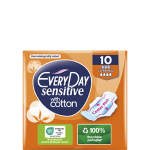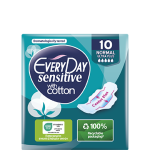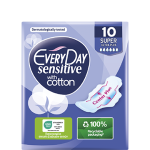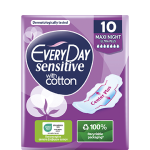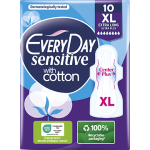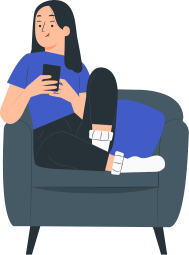Menstruation...even if it seems like the 'scary’ movie of the month, it is extremely important to the female nature, since it is related to the ability of bearing children. The endometrium...a coat which covers the internal uterus prepares itself each month (by getting enlarged and enriched with nutrients) to potentially accept and develop the fetus. If no ovum is fertilized, the coat dissolved amongst a quantity of blood, only to restart the endometrial developing process of the next cycle. This will follow month after month...
A normal cycle, takes an average of 28 days. It starts the first day of the period and ends the day before the beginning of the next period. However, this is not definite and in many cases the menstruation may appear anywhere between the 21st and 45th day. Typically, ovulation happens the14th day of the cycle, while the fertile days are usually 11th, 12th and 13th. However, a premature ovulation can happen on the 7th or 8th day or likewise a delayed ovulation on the 18th or 19th day. Over the years, the period cycle is stabilized. As a result, most women can estimate their menstruation cycle. It is important once the period begins, to record the dates of your cycle on a calendar and keep track of how prompt your cycle is. This recording will prove very useful, whether scheduling your next visit to your gynaecologist, or when planning...your vacation! You can use EveryDay’s period tracker if you want to calculate when you will get your next period. If your period is still irregular, or delayed for longer than a week, it is advisable that you consult a gynaecologist. If your cycle is stabilized and is lagging behind, you should have the following in mind: pregnancy (if you’ve had sex), stress, diet or weight loss, excessive exercise, or a recent onset of a drug. In any case, a gynaecologist’s opinion is necessary.
During menstruation our body eliminates part of the endometrium amongst blood. The colour of these secretions varies from brown to deep red. You get brown colour in the beginning or the end of the period. Congealed tissue indicates a large amount of blood. If this happens quite often it would be a good idea to consult your doctor.
Problems that call for immediate medical attention are:
- Bleeding between periods
- Amenorrhea: lack of periods – periods that may have started and stopped, or not started at all
- Dysmenorrhea: painful menstruation, often with cramps
- Areomenorrhea: very rare menstruation
- Menorrhagea: exceptionally heavy periods
These anomalies in the period may be caused by:
- 90% of anomalies in menstruation are due to hormonal problems.
- Psychological disturbances caused by changes in a woman’s environment (e.g. moving to a new country, home, office), personal problems, etc.
- Strict and unbalanced diets with rapid weight loss.
- Use of drugs.
Pain in the abdomen and cramps, are some common period symptoms. However, not all women get them. Some get intense symptoms (dysmenorrhea), others milder and some are lucky not to have any! These days of the month we may feel tired or have a bad mood, or feel pain in waist and abdomen that are mainly due to uterus contractions to facilitate blood exit. Pain symptoms also vary from woman to woman and can effectively be treated with hot baths and warm compresses (using hot water bottles). To naturally soothe cramps during period, try to drink plenty of water and choose foods rich in Omega 3 fatty acids, vitamins B, C, D and minerals, such as nuts, citrus, whole grains and broccoli.
Of course she can be as active as the other days. The important thing is to listen to your body and do exactly what you feel. If, for example, you feel weakness and you have a heavy flow and all you want to do is stay home and rest, this is what you should do. Likewise, if you feel full of energy and in the mood for sports, there is absolutely no reason not to work out. At the same time if you feel pain, exercise will improve your blood circulation and the secretion of endorphins, will help you considerably to feel better.
Yes, a daily shower is necessary to cleanse the genital area from blood and various secretions. Furthermore, as the woman has the tendency to sweat easier during these days, showering is essential for hygiene and psychological reasons.
Generally, no evidence suggests that swimming in the sea or the pool, is prohibited during period. Of course, depending on how strong your period symptoms are, you may hesitate even thinking about it. However, swimming is not prohibited by doctors. It depends purely on your mood. In some cases is even a method of treating dysmenorrhea, as movement in water and generally mild exercise can have a calming effect on the symptoms during the cycle.
Nevertheless some basic hygiene rules must always be applied:
- Do not allow the wet swimsuit to dry on you. Always carry a second swimsuit or underwear, to change as soon as you exit the sea or pool.
- Try to avoid very cold waters. Low temperature causes vasodilation which may increase the discomfort you feel during period.
- Do not lie directly on sand or pebbles. Make sure you always carry a mat or a towel, since the risk of infection is very likely, even if the beach looks clean.
All you have to do is choose the right napkin for you! It is very important to find the right size and type of napkin that fits you best, according to your flow, your period, even your body type. Also, every day of your cycle is not the same ...The difficult days with heavy flow, are the 1st, 2nd and 3rd day, after the 4th, usually the flow is reduced ... Do not worry! EveryDay offers a wide range of sanitary napkins, varying in types and sizes, specifically designed to best fit your needs. So if it is the 1st – 2nd day of your period and you have a heavy flow, EveryDay Extra Long will give you the extra protection you need. If your period is almost over and you just need more discreet protection, EveryDay Mini will give you the solution. If your skin is sensitive or you experience irritation problems, EveryDay Sensitive with hygienic extra soft cover, will offer you the safe and skin friendly protection that you need.
If you wonder what type of sanitary napkin EveryDay is ideal for you, click on "Find your EveryDay", answer 4 very simple questions related to your cycle and in just seconds you will have the answer!
On the 2nd half of the cycle until the 1st day of the period, levels of female hormones estrogen and progesterone rise in the blood, causing fluid retention throughout the body, especially in breasts. The level of discomfort varies from woman to woman, but it is a normal response. Common analgesics (such as paracetamol), avoidance of caffeine, while supporting the breasts with a comforting bra, will help considerably.
The breast self-examination by palpation, is a very simple and easy way to find a single woman changes her chest, such as unusual lumps or nodules fluctuations, which may constitute early symptoms of breast cancer. Of course, any unusual changes track, we must mention them directly to our doctor. Normally the breast self-examination should be done thoroughly once a month (ideally the 7th or the 14th day of our cycle) and more superficially, every time you bathe. Unfortunately this simple procedure is something one often puts off, especially out of fear that we will identify something that is worrying. A fear of both human and irrational, which must be overcome, as prevention and early detection are the best way against any disease. Of course self-examination must not under any circumstances replace regular clinical breast controlled by our doctor, especially if we have passed the age of 40.
It is rare case, but not impossible, especially if your cycle is very short (ex.21 days), or if your cycle is irregular. In any case, for a young girl to refrain from an unwanted pregnancy and from sexually transmitted diseases, she should only have sex using condoms.
Each woman, before even born, has 2 million ovum in her ovaries. In adolescence, the ovum number is about 400.000, but only about 400 follicles mature and ovulate during her life. Mature ovum will start being released in adolescence when the monthly cycle of the period begins and ends with the menopause (end of period). The release of an ovum per cycle, in 1 of the 2 ovaries, is called ovulation.
Vaginitis is a common unpleasant and uncomfortable situation that frequently occurs to women of all ages. Itching in the genital area may be the main characteristic, however other symptoms like more vaginal fluids than usual with different texture and color (viscous white or yellow and smelly), pain during contact and possible urination difficulty. Vaginitis often follow summer holidays, as bacteria and fungi responsible for infections are mostly sea "residents". However, vaginitis can occur all year round, caused either by sexual contact (STDs) or public toilets. Besides infections, vaginitis may also occur as a result of hormonal changes during puberty, pregnancy or lactation and also to people with chronic diseases. It can also be caused by the use spermicides or antibiotics. More specifically, antibiotics weaken the body's immune system and as a result the normal microflora of the genital area, which acts as a "shield" against infections by pathogenic microorganisms. As a result is an area prone to infections. Antibiotics may additionally increase the number of microorganisms that are normally present in the body (normal microflora) and this can also cause unpleasant symptoms. Although vaginitis are usually harmless and manageable, treatment should be immediate before causing any damage. Usually, the doctor will need a vaginal fluid cultivation before recommending the appropriate treatment (by vaginal creams or suppositories in combination with oral antibiotics). If there is a sexual companion, the doctor may also recommend a treatment. At this point we should point out that genital area cleanliness is essential and should be performed only with water, unless the doctor recommends a specific treatment. The inside of the vagina cleans itself and generally internal washes with antiseptics, soap or plain water disturbs the natural flora of the body and changes the PH, favoring vaginitis. Finally, as bacteria and fungi "love" a hot and humid environment, synthetic underwear and tight pants should be avoided, especially if there is you have vulnerability.
Personal hygiene during a period is the most important thing a woman should consider. The basic hygiene rules should be respected, and at the same time we must change your pads regularly. This will help to maintain the health of the sensitive area and also feel comfortable and fresh. Thorough cleaning of the sensitive area once a day is enough. If cleanliness is done too regularly is threatening for the disturbance of the regions natural flora. Sensitive area can easily show irritation because of moisture and friction during movement. Therefore it is good to watch out. Synthetic materials can cause a "warm and sweaty" skin area. The underwear should be rinsed off thoroughly by detergents. According to consumer research panels held in Greece, 25% of women suffer from irritation in the sensitive area during the period, give caused by pads top sheets. If your skin is sensitive, use pads with skin friendly cover.
EveryDay Sensitive is included in EveryDay’s range and their hygienic extra soft cover provides you with hygienic protection without irritations.
When pantyliners are changed frequently, there is absolutely no problem. This is the primary reason for their use, as the ability to change them often guarantees constant freshness. However, it is better to use pantyliners with a 100% cotton topsheet, which provides the most hygienic protection. EveryDay All Cotton are the only pantyliners with 100% cotton topsheet. That offers the purity of nature in touch with your skin, every day. Thanks to their individual wrapping, you can always have it in your handbag, in order to feel fresh and natural protected at any time.
The use of pads is healthier than that of a tampon. Prolonged use of highly absorbent tampons assists the overgrowth of bacteria in the vagina. Bacteria can produce a toxic substance that may cause a serious shock and this rare condition is called Toxic Shock Syndrome. For that reason, it is advised to remove tampons after 4-6 hours of use, and use napkins during the night. It is advised to use pads with an extra soft top sheet, offering hygienic protection without irritation.


